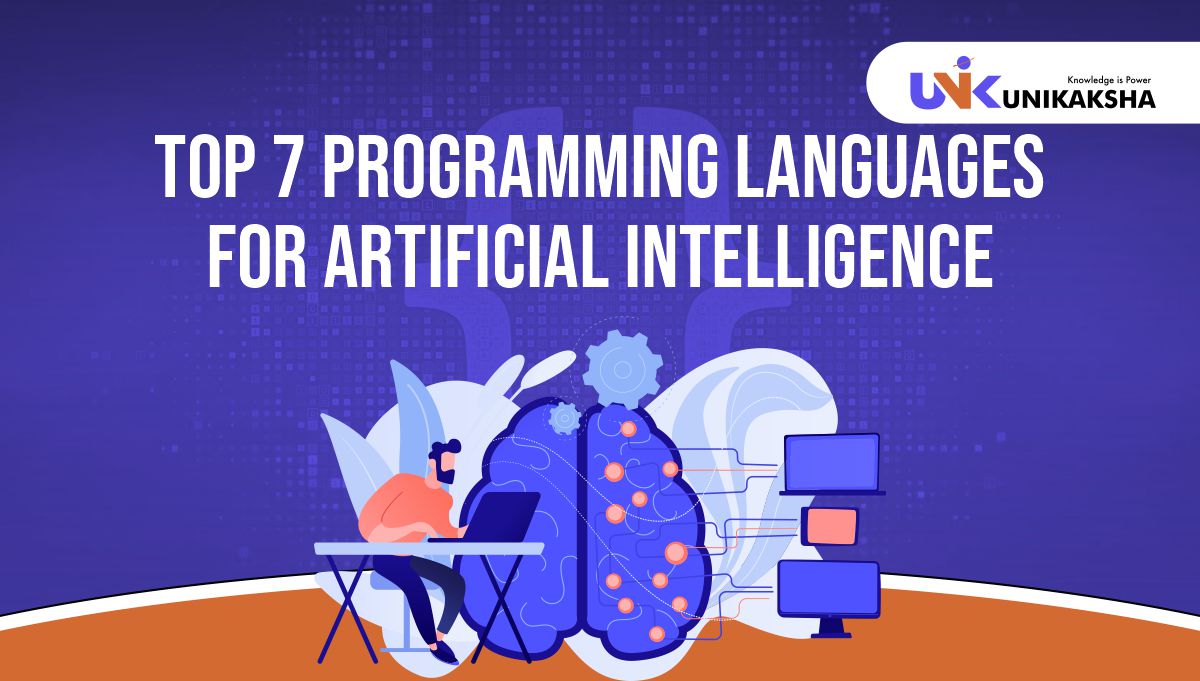Top 7 Programming Languages for Artificial Intelligence

If you’re working on a project based on artificial intelligence and are struggling to decide which language you should use to program it, you have come to the right place. Essentially, artificial intelligence machines are built to perform tasks in a manner befitting that of human intellect. As a programmer developing AI, you must know the languages with which to develop an AI project before building it!
Top 7 Programming Languages for Artificial Intelligence that are used extensively used in Projects
7) Python Programming Language
Python is considered one of the most demanded programming languages among AI developers due to its simplicity and precise documentation. Furthermore, its easy-to-use syntax allows you to spend a lot of time planning the core structure, thereby making it a premier choice for Artificial Intelligence processes.
Python is backed with an object-oriented programming model, readability, focuses on agile development, and allows algorithm testing. Another advantage to consider it’s the support of numerous libraries like Pybrain, SciPy, and Numpy in python to solve AI/ML problems and make our tasks easier.
Related : Learn more about the Top trending Python libraries of 2022
6) R Programming Language
R programming language was the top choice of developers in its initial days. However, with the advent of machine learning data science, and AI, its popularity has dramatically risen. It is an exclusive language for fixing statistical/numerical problems. As data science, AI, and MI requires significant amounts of numerical libraries and features, R has becomes the language of choice for top AI companies to solve complex issues.
One can easily create a properly designed publication-quality plot with formulae and maths symbols (where needed) by using R. Besides, being a general-purpose programming language, R comes with several packages like Gmodels, Tm, Class, and RODBC. These packages implement MI algorithms easily, thereby solving the associated problems with ease.
If you are interested in learning the basics concepts of R programming language, look no further than UniKaksha. We offer Introduction to R as a free course and Knowledge Mining using R as our top featured course. Dive in to understand the interdisciplinary area that is used to extract potential and meaningful information from complex data.
5) JavaScript Programming Language
Since its inception, JavaScript has been a popular choice for creating interactive web applications and online programs. However, it has entered the ML/AI fields and has built a strong reputation. Its AI capabilities primarily involve the ability to interact smoothly with other source codes including HTML and CSS.
JavaScript is also backed by huge communities and many libraries to execute the ML/Artificial Intelligence tasks. These include – Synaptic for creating and training neural networks, Mind for data training, and ConventJS for implementation of Deep Learning. Furthermore, JavaScript can easily manage front and backend functions with ultimate no difficulty.
4) Lisp Programming Language
Lisp was invented by John McCarthy, the father of artificial intelligence in 1958. Lisp is capable of effective processing of symbolic information thereby making it the most suited programming language for AI development.
It is very flexible and adaptable, especially good for rapid prototyping, creating dynamic objects, problem-solving, and creating codes that adapt to it.
However, it has its downsides. Its syntax is very bizarre as compared to other programming languages thereby making Lisp harder to understand. Library and function support is also very limited.
Lisp language is still used by leading AI companies due to its extensive scope of combining computer science and robust datasets, to enable problem-solving.
3) C++ Programming Language
With its capacity to transfer info through the hardware, C++ has emerged as one of the fastest languages. It’s used specifically for time constraint ML/AI projects and functions well with statistical AI approaches. It offers a strong grip over performance and runtime Its templates are safely used for generalizing the APIs.
However, C++ is not the premier choice of many AI companies. This is because of limited library support and a complex syntax. AI processes demand intricate automated solutions to run with ease, this is where C++ lags.
As C++ is cost-effective, many AI companies are attracted to it. Couple that with the C++ for Open CV support – an extensively used computer vision library.
2) Julia Programming Language
Julia is known for its speed and approachability. It lets you solve multiple software problems and computational and numerical analysis; without the need for a separate compilation. It has a dynamic type system that facilitates developers to use Julia for almost any process.
The syntax is very much similar to R, Python, and speedy like C++. Its features include multi-dispatch support, macro programming abilities, and an in-built package manager. Owing to great customizability and deep mathematical roots, it has become the favored language of several AI professionals and corporations.
1) Prolog Programming Language
Prolog is the abbreviation for Programming in Logic. It is amongst the oldest programming languages that work on three crucial factors – rules, facts, and goals. Its algorithms are executed based on logical inferences, searches, and logical-based AI system development.
Its efficiency is remarkable especially when it comes to data structuring and backtracking making it the perfect language to create voice assistants, GUI, and Chatbots. Its ability to comprehend and match the patterns, search and structure data logically and find a better path makes it a leading language for problem-solving in AI.
Over to you!
The languages discussed in this article are the best programming languages for AI projects. The choice depends on how technical or easy you want your project to be. With basic project knowledge and understanding, you can choose the best-suited programming language for your AI processes.
Is there any other programming language for Artificial Intelligence processes? If, yes then feel free to add in the comment section below! Visit UniKaksha for training and certification. We offer courses in Game Development using Python, Introduction to Python Programming, OOps using Python, Introduction to Java [English], and more. The content is created by industry leaders who have immense expertise in their area domain. Get certified, Get Empowered, and land those high-paying programming jobs today!
About the Author
Sonali is an accomplished Author, Content Writer, Copywriter, and Ghostwriter, known for her ability to create engaging and captivating communications. With over 11 years of experience, she has developed a diverse industry background in Education, Travel, Retail, Events, and Fashion . Quality over quantity is what she firmly believes in. At UniKakhsa, she leads a team of talented technical writers, dedicated to delivering valuable content to readers through our blogs.
 Related Posts
Related Posts
|
Offerings
|
FutureFirst
|
SmartStart
|
GradEdge
|
SelfMastery
|
|---|---|---|---|---|
|
Doubt clearing session
|
                                          |
                                          |
                                          |
                                          |
|
No of job opportunities
|
15 | 25 | 15 | 3 |
|
Course Access
|
5 Years | Lifetime | Lifetime | 5 Years |
|
Free Library Courses
|
                                          |
                                          |
                                          |
                                          |
|
Job Assurance
|
                                          |
                                          |
                                          |
                                          |
|
Language
|
English/Hindi | 5 Language options | English/Hindi | English/Hindi |
|
Live classes
|
100% | 100% | 100% |                     |
|
Offline
|
                                          |
                                          |
                                          |
                    |
|
Industry Expert Sessions
|
                    |
                                          |
                    |
                    |
|
Internship (IOP)
|
                                          |
Guaranteed | Guaranteed | Based on evaluation |
|
1:1 Mentoring sessions
|
                    |
                                          |
                    |
                    |
|
Customer Support
|
                                          |
                                          |
                                          |
                                          |
|
Dedicated Program Manager
|
                    |
                                          |
                    |
                    |
|
Opt for Placement services
|
Compulsary |                                           |
                                          |
                                          |
|
Career Support
|
1 Year | 18 Months | 1 Year | 3 Months |
|
Regular assessments
|
                                          |
                                          |
                                          |
                                          |
|
Report cards
|
                                          |
                                          |
                                          |
                    |
|
Career Guidance
|
                                          |
                                          |
                                          |
                    |
|
Certificates
|
                                          |
                                          |
                                          |
                    |
|
Scholarship
|
                                          |
Available | Available |                     |
|
Trial Class
|
1 week | 1 week | 1 week |                     |
|
Outside placement
|
Paid | Allowed | Allowed | Allowed |
|
Premium Jobs
|
                    |
                                          |
                    |
                    |
